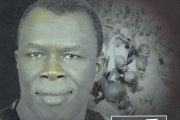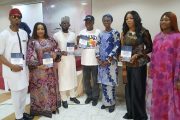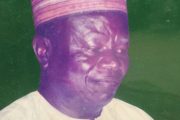Ogoh Alubo, Professor of Sociology at the University of Jos in Nigeria, passes a verdict of a horrible year on 2020 in a detailed assessment of it just before Nigeria and the rest of the world shoves it aside in favour of 2021.
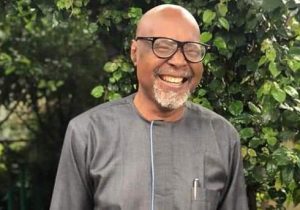
The author
By Ogoh Alubo
The year 2020 began like any normal one with many making resolutions and hoping they would achieve what eluded them the previous year. The pursuits are both material and non-material, including moral and religious rectitude. Progress was being made before most of these dreams came to a screeching halt via the Coronavirus, better known as Covid-19. Its multifaceted depredations are everywhere. The pandemic is in addition to lingering issues of insecurity, economic decline and the overall seeming discount of the value of human life of Nigerians. The year qualifies as a horrible one with all the problems recorded, and existing ones exacerbated.
The first case of Covid-19 in Nigeria was on February 27th when an arriving Italian was found through routine monitoring to have the virus. The outbreak of Covi-19 has been a watershed in the annals of Nigeria and the rest of the world. Nigeria has had to cope with containing the spread and has kept the number of infections and deaths at some appreciable level. In the past few weeks, the rates have soared. The more devasting aspect was the impact of steps taken to stem the spread. There was lockdown for over a month during which all vehicular movements, save those ferrying food stuff and those of frontline health staff, were prohibited. All around, it was an effective 24-hour curfew, and sheer ennui of staying at home round the clock was a major challenge. Our economy which is known to be propelled by the informal sector of hawkers, street traders, wheelbarrow pushers et al, fell silent. The mama-puts, the akara sellers, the suya and sugar cane sellers were forced to disappear. This no-movement order applied to taxis, buses and the kabu-kabu business. The economic impact of the lockdown can only be imagined. It meant that effectively, there were no incomes during the period.
Perhaps it is in appreciation of this difficulty that some palliatives were provided. In many locations, state governors, public spirited individuals and religious organizations provided some relief to the most vulnerable. The federal government too gave out some. However, it happened that some of the palliatives either did not reach the advertised destinations at all or only by a miserable fraction. It took months for a clearer vision of the whereabouts of the palliatives to emerge—many states hoarded them in warehouses until the so-called hoodlums decided to help themselves. There were impassioned pleas by state governments for the return of the looted palliatives. In at least one state, the palliatives were found displayed in the open markets almost 1000kms away; there was no attempts to recover them.
The response to what President Donal Trump prefers to call China virus has created problems; never mind that this same virus and his response, including lack thereof, was the major issue which denied him re-election in the November 3, 2020 polls. But even as his loss was conclusive, President Trump has kept fighting, hoping against hope and keeping to his words that he would accept the results of the election only if he wins. Well, conceding defeat or not, Joe Biden, who defeated him, will be inaugurated on January 20, 2021 as US 46th President. Trump will, willy-nilly, become an ex-president.
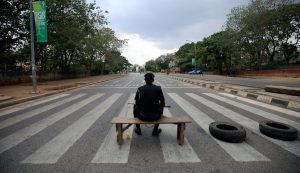
Not a single soul on a Nigerian street beyond a lone guard, all because Covid-19 was in town
An economic thick pall descended on Nigeria; the anguish includes harassment by security forces. Some of the heavy trucks ferrying food stuff were found to have stowaways concealed among cattle or sacks of grains. This provided the security operatives the grounds for extortion as the drivers were compelled to “settle”. There were also extra judicial killings; in the first week of lockdown on March 28, the number of people killed by security forces for violations of lockdown exceeded that by the virus; the figure was 18 for the former and 12 for the latter. There were other controversies over the continuation of school feeding during lockdown and school closure. Two hotels were demolished in Port Harcourt for “Covid-19 violations”. Another controversy was the furore over Chinese doctors. The virus, the world knows, started in China so Chinese doctors should be well placed to assist Nigeria or any other country with curbing the pandemic. The importation of Chinese doctors was against all protestations from the Nigerian Medical Association and others. But it soon happened that the same Minister of Health who received them on arrival and laid on diplomatic protocol and with whom they were meant to work would say later that not all the 15 were doctors, some were discovered to be technicians. Worse, he said he no longer knew their whereabouts. Perhaps, in a display of inter -ministerial cooperation, it was his Interior Affairs counterpart who cleared the air: they were working with a Chinese construction company, obviously a different mission than advertised.
Some of the lingering devastation by the pandemic includes movements by sea, land and air. Air travel was halted and its resumption has been gradual and with conditions. The airlines are compelled to maintain distancing which translates to vacant seats irrespective of available number of passengers. This is perhaps why domestic airlines have hiked fares by some one-hundred percent. Those who wish to travel abroad must now, obtain Covid-free certificate prior to departure and, in many other countries, on arrival.
There is as yet no widely instituted programmes of Covid relief for the informal sector. What relief is planned for the street corner food vendors, the sugar can seller sundry others in the daily hustle to put food on the table but whose capital was eaten up during the crisis? There is equally no advertised relief for the many who suffered gender based violence, repeated beatings and rapes during the lockdown. The do-to list thrust forth by Covid-19 has many items, including the psychological dimension.
The items of Covid-19 disruptions include the halt of football competitions. All major leagues stopped and only now resuming slowly. But as there are no spectators at the moment, gate takings and associated businesses such as the sale of finger foods (small chops) and drinks, are suspended. At home here, the viewing centres which had mushroomed in the past few years as part of the informal sector lost all income; they are left with months of unpaid rent and cable TV subscriptions. Covid-19 is one pandemic like no other, besides leading to the postponement of the Tokyo Olympics, the world of sports is only beginning to pick up the pieces.

A welcome optimistic note from a quarter that can afford optimism
The spread Covid-19 in Nigeria has grown steadily, but mercifully not as feared, nothing comparable to countries like the US, India or Brazil. By the last count slightly over 72,000 Nigerians have been infected and slightly over 1000 have died. Nigeria’s Centre for Disease Control, CDC, data which the apex organ, the Presidential Task Force on Covid, PTF, uses are not nuanced enough to be attentive to age groups most affected, rural and urban locations and other details which can better assist the control efforts.
This too is the year which saw #EndSARS campaign. For two weeks youths held matches, demanded the scrapping of the now discredited Special Anti Robbery Squad, (SARS), an end to corruption and the demand for creation of jobs. They sang solidarity songs and raised the Nigerian flag in an orderly and peaceful manner. They cleaned up after themselves, treated those with bruises and even had mobile toilets on hand. This scenario was mostly in Lagos but also in Abuja and some State capitals.
Part of the justification for the year’s epithet was the suppression of #EndSARS at Lekki toll gate on October 20th. Suddenly, people in military uniform were deployed but the protesters chanted all the more and continued to wave the national flag. What really happened remains mired in controversy. Rather than protect them from attacks many of the flags became blood stained. This then is a line now shared with the French National anthem, La Marseillaise, l’étendard sanglant est levé, which translates as the “blood stained flag has been raised”.
According to the official line, the campaign was infiltrated by hoodlums, some of whom, according to respected columnist, Idowu Akinlotan (Sunday Nation, December 6th) were actually government sponsored. As everyone now knows, hell was let loose on the protesters at Lekki toll gate and the narrative has become a mind boggling diary of denials. First, the military declared as fake news any thoughts that they went to Lekki at all and, therefore, couldn’t have carried out any killings there; this is even as some NGO tracked troop movements on camera, with date and time from Bonny camp to Lekki where the protesters were massed. The story later changed —the army went there but had only rubber bullets and killed no one. There were further controversies about who gave the orders for the troop deployment: Lagos Governor, the Commander of the military formation or the Commander-in-Chief? By the rules of engagement, only the C-in-C could give such orders.
When the CNN aired a two part report on the Lekki incident, the Information Minister was not amused. He deprecated CNN for engaging in what to him was one sided reporting and insisted the network be sanctioned because the report violated journalism ethics. I suppose crisis has a way of bringing forth the genius in people, otherwise before now many would have pointed more to Dan Agbese, Olatunji Dare, etc, as the known doyens of journalism in Nigeria rather than to Lai Mohammed. We wait to see the nature of sanctions he has reserved for CNN. Before then, he might have to return to the two versions of truth about the Lekki incident. In addition to spent cartridges shown on CNN, complete with country of origin and supply papers to Nigerian military, there is now visible evidence of people with gunshot wounds, some of whom have appeared at the Lagos State tribunal.
The Lekki incident still lingers. On December 10th, some Nigerians in the Diaspora took up paid advertisement in New York Times demanding that President Buhari treat Nigerians better. Their statement shows clearly which of the two versions (one asserted by Lai Mohammed and the other reported on CNN) of the Lekki incident resonates with them.
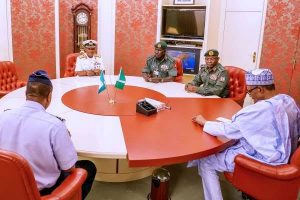
A president and his security chiefs
On December 7th at the Chief of Army Staff’s Conference, President Buhari spoke glowingly about the role of the military in addressing the #EndSARS as well as in dealing with bandits, terrorists, kidnappers, and cattle rustlers. He singled out Operation Sahel Sanity in the Northwest and Operation Fire Ball in the Northeast for commendation. These operations were in place before recent security breaches such as the Zabarmari slaughter of peasants.
Just when all thought mass deaths were behind us, the slaughter of 43 peasant rice farmers (UNDP said 110, Mahmud Jega, another source, indicated 67 in the Daily Trust, 7/12/20) unfolded. But their deaths unearthed a new explanation: according to Garba Shehu, Presidential media aide, they may not have obtained military clearance before going to their farms. This is one step short of saying they brought the death upon themselves. This neither showed that we all can pursue legitimate means of livelihood without let or hindrance nor does his theory of nonreceipt of military clearance explain the regular raids on villages and even on the army camps. Was clearance ever the issue? The Borno Governor, Babagana Zulum’s convoy has been attacked at least three times. Was that because he failed to obtain military clearance? There is no doubt about the urge to defend, even the indefensible, by those in positions of power. But they must also remember there is future credibility and must therefore avoid the temptation of talking de one wey no dey book.
The intractable Boko Haram menace is a cruel reminder that reality expressed by the powerful is often different from lived experiences. Back in 2015, President Buhari announced that Boko Haram had been technically defeated. Five years on, these “defeated” rebels continue to kill, pillage, abduct and launch attacks in the North east region.
The catalogue of violence during this horrible year is not restricted to the North-east. Just the other week, a secondary school in Katsina State was invaded and up to 300 students were abducted. Mercifully they have now been released although the number abducted is not ascertained. Again, Garba Shehu announced that only 10 students were abducted, a figure he later retracted. He did not mention whether or not the students had clarence to be in school.
There are also regular kidnappings along Kaduna-Abuja road and frequent explosion of violence in Southern Kaduna as communities are set alight. In other States such as Zamfara and Katsina, “bandits”, effectively a parallel state, now have their security order and levy taxes before harvests are allowed. His Eminence, Sa’ad Abubakar, the Sultan of Sokoto said it all: a holistic picture of the situation indicates that the entire North has become the most dangerous place in Nigeria. Calls for a fresh pair of hands—and fresh ideas– as Service Chiefs which will hopefully change the situation for the better have so far gone unheeded. As things stand, we might as well expect more of the same.
The year must also be remembered for the frequent increase in petrol prices logging seven times between the months of May and November. By the week of December 7th, there was another announcement of change in fuel price, although, this time, a downward review.
We look forward to a happier future, realized dreams and engagement with government in more rewarding ways. We expect that many of the avoidable catastrophes of 2020 will be behind us. We can therefore look forward to welcoming 2021 as a felix annus.








